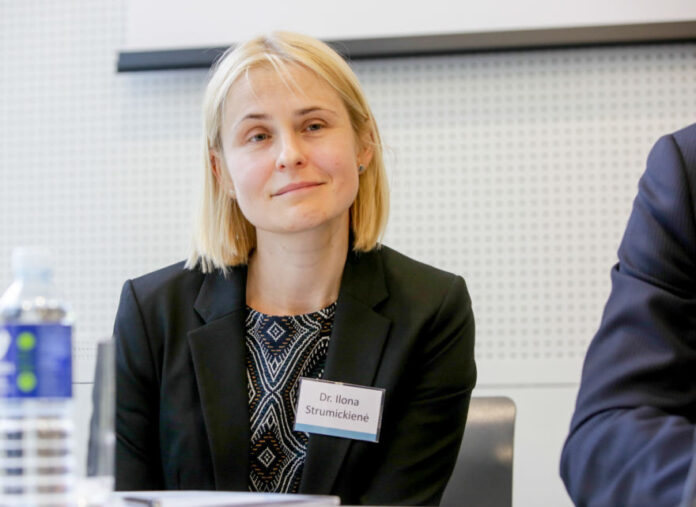
“Pasaulio lietuvis” is an online magazine publishing articles from and about the diaspora, in Lithuanian. This article by Dr. Ilona Strumickienė of the Vytautas Magnus University Lithuanian Emigration Institute outlines aspects of the phenomenon of emigration from and re-immigration to Lithuania, and contributions to the homeland made by the diaspora.
Emigration is a vital issue in Lithuania, many citizens having left after the reinstatement of independence in 1990. Their exodus was motivated largely by opportunities for better opportunities abroad. In her article published in Pasaulio lietuvis, Ilona Strumickienė of the VMU Lithuanian Emigration Institute writes that the volume of emigrants has decreased over recent years, and a new phenomenon has emerged in the form of “remigration” or re-immigration. It is of course being encouraged by the government, and promoted by the media.
Research shows that re-immigration is a natural element of the migration process. “Returnees” go back for various reasons and in various numbers. It is natural to perceive re-immigration as a positive phenomenon, and it is tempting to see it as the best outcome of an emigrant’s relationship with Lithuania. However we must remember that the decision to “go back” or go to the country of our parents or grandparents can be influenced by many variables. Even so, in some cases remaining in the diaspora can be more beneficial for the individual, for the Lithuanian diaspora community and for Lithuania.
Political events in the mid-20th century resulted in approximately 60,000 Lithuanians settling in the West, where their community activities focused on two things: helping Lithuania regain its independence, and preserving their Lithuanian identity in the diaspora.
Lithuanian statehood was re-established on March 11, 1990, and met with joy among Lithuanians throughout the world. It was the fulfillment of a 50-year dream, opening the way for new, closer cultural and economic relations with Lithuania. The Lithuanian diaspora will be one with the nation, wrote one author.
Trips to Lithuania became commonplace – visiting relatives and touring, business and exchange programs had many participants from the West. At first no one thought of going back to live in Lithuania. Both organizations and individuals across the world enthusiastically greeted the creation of the new nation, and their support and experience were very important in developing Western-oriented institutions.
Recently, there has been more research done regarding the support provided by Lithuanians in the diaspora, with special attention to their political lobbying efforts and financial contributions, however the extent of their volunteer work and the value of their assistance in systemic changes and innovations in many areas has not yet been fully recognized, writes Strumickienė.
As yet there is no solid data regarding how many Lithuanians of post-war/DP generations returned to Lithuania. Those who did, returned for a variety of reasons, from the desire to die in their homeland, to taking advantage of business opportunities, all the way to fulfilling their mission – to contribute to the well-being of Lithuania.
Even during the years of “rebirth”, Lithuanians from abroad realized that Lithuania and the diaspora were dissimilar not only because of geographical distance, but because of differences in mentality as well. The predominant image of Lithuania for the diaspora was idealistic, even idyllic, whereas in reality, Lithuanian society was traumatized, deformed and bereft of traditional values and moral stability. This resulted in a more reserved attitude in some members of the diaspora and a hesitation to return – while, on the other hand, others became more motivated to do so. The author of the article states that there were examples of former DP/émigrés who went back to Lithuania not to participate and assist, but to take on leadership roles, which often resulted in opposition and rejection from the Lithuanian public. The prime examples of hugely successful contributors to Lithuania were former president Valdas Adamkus, Cardinal Audrys Juozas Bačkis and Major General Jonas Kronkaitis.
The most significant contribution by the diaspora to the Lithuanian nation and society was in the field of politics, where individiuals returned to participate in Lithuanian political life whether through parties functioning in the diaspora, through the press and through political analysis. Their efforts were most important in expanding Lithuanian society’s world view and establishing social/political values. They were instrumental in implementing procedures based on Western standards, such as in the diplomatic service, at a time when representing Lithuanian interests on the international stage was a new endeavour. Assistance in modernizing Lithuania’s defense system and adapting it to NATO standards was also an essential area of expertise provided by Lithuanians from the diaspora.
The diaspora also contributed to Lithuanian religious life, with assistance by clergy and laity in implementing Vatican II decisions, rebuilding the infrastructure destroyed by the Soviets, familiarizing the faithful with global trends and informing Christian values.
Education was another area in which the diaspora had a major influence in the 1990’s. Educators and activists abroad assisted in reopening Vytautas Magnus University, the International Relations Institute at Vilnius University, and establishing institutions fostering religious education. The pedagogical APPLE program for teachers was also initiated by educators from the diaspora. Cultural heritage – books, periodicals, archives and artwork was sent to Lithuanian memory institutions, and many galleries of work by diaspora artists were established in both cities and towns. Representatives of the diaspora also initiated the creation of various institutions such as the Information Centre for Returning Lithuanians, and the World Lithuanian Community Office at the Lithuanian Parliament.
Most of all, the activism of the Lithuanian community abroad introduced the concept of philanthropy, with special foundations established to provide support for various social groups.
The current trend is providing Lithuanians in the diaspora with assistance in returning and re-integrating into Lithuanian society. More about that next time.





























